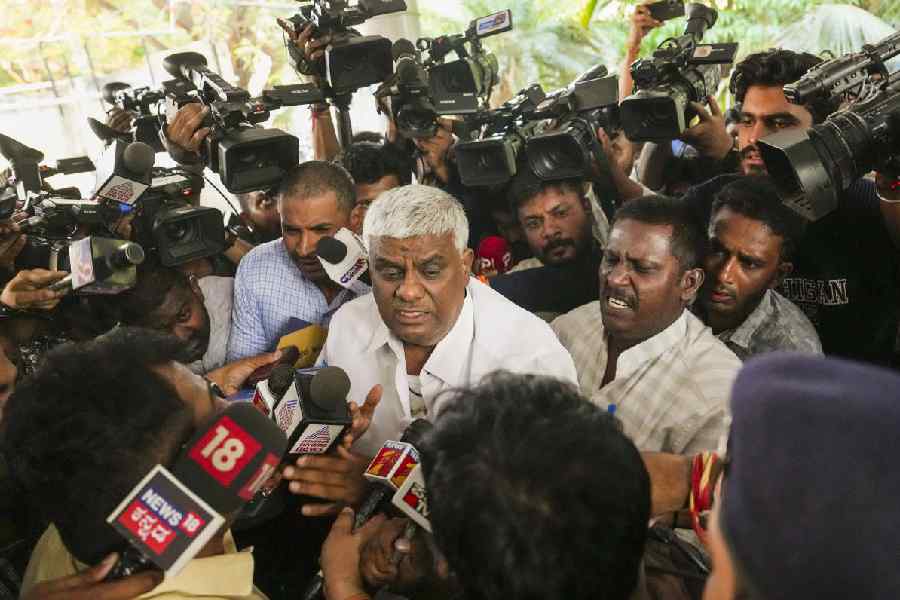Comfort wear
Sir — Looking one’s best at work every day can be quite taxing. It is thus understandable that young people in China have had enough. They are turning up at office in ugly, mismatched attires as a form of protest against poor work cultures and tyrannical bosses. While this seems like yet another futile rebellion, can Gen Zers be blamed for lashing out against the expectation to dress up over and above the mounting work pressures? Rather, wearing comfortable clothes can actually help people cope with the stress of returning to office after the pandemic. With people having become used to remote work, comfortable and informal clothing might help people settle into the office easily and act as an incentive to step out in the scorching summer heat.
Amartya Mitra, Calcutta
Hellish flight
Sir — The true test of a brand’s calibre is adversity. The rains in Dubai, for instance, tested Emirates’ claim of being the world’s No. 1 airline. It failed miserably. A young relative was coming back to Delhi from San Francisco via Dubai. Despite ground realities, the connecting flight was shown to be on time. The incoming flight could obviously not land on time and, one and a half hours later, anxious passengers rushed to the gate but could not find anyone at the Emirates desk. An hour later, an email informed them that the flight was cancelled and asked them to proceed to the connection desk.
What unfolded after reveals extreme insensitivity. Passengers, including pregnant women and senior citizens, were made to stand for six and a half hours without any information. The flight to Delhi, scheduled for 10 am, finally departed at 3 pm. In the meantime, no one was to be found at the information desks and no announcements were made. Once the flight landed in Delhi, the fliers found out that their baggage had still not arrived in spite of a message sent that the baggage had been loaded onto the flight. Four days since then, at the time of writing, the baggage still had not arrived and it was impossible to get in touch with Emirates regarding this.
What happened to the oft-touted values of transparency, responsiveness, fairplay and customer satisfaction that the world’s ‘best airline’ boasts of? Moreover, what of India’s regulatory and licensing body — the ministry of civil aviation? Customer satisfaction is an illusion in the absence of strong regulatory mechanisms and accountability.
Prabal Basu Roy, Bengaluru
Trail of lies
Sir — More than 17,000 Indians have jointly written to the Election Commission of India on Monday, seeking action against the prime minister, Narendra Modi, for the communal remarks and falsehoods against the Congress. They claimed that Modi’s statements have hurt the sentiments of millions of Indians. His speech was undemocratic and blatantly anti-Muslim and a clear attempt to woo Hindu voters. The EC’s failure to take notice of Modi’s hate speech will undermine its credibility and autonomy. Meanwhile, the Congress has challenged the prime minister to produce evidence to support his claims.
Bhagwan Thadani, Mumbai
Strong bond
Sir — The editorial, “On the trail” (April 22), posed a timely question — where is democracy headed? The power to save democracy lies with the Indian citizens who can do so by exercising their voting rights. On the campaign trail, the prime minister has defended the electoral bonds scheme, which was scrapped by a five-judge bench of the Supreme Court headed by the Chief Justice of India. The incumbent Union finance minister, Nirmala Sitharaman, too, defended electoral bonds and claimed that a similar scheme will be reintroduced. This is an insult to the judgment of the apex court.
P.K. Sharma, Barnala, Punjab
Sir — The prime minister, Narendra Modi, continues to defend the electoral bond scheme despite the Supreme Court finding it unconstitutional (“On the trail”). This is shocking. Modi has stated that the bonds were transparent and opposing them was a mistake. However, in reality, it is the court’s intervention that brought transparency into the system of electoral donations.
S.S. Paul, Nadia
Iron fist
Sir — The suspension of a Dalit PhD scholar from the Tata Institute of Social Sciences for screening the BBC documentary, India: The Modi Question, on the campus, among other reasons, raises concerns about the freedom of speech and expression (“Modi-critic Dalit scholar suspended”, April 22). Suspending students for taking part in protests or disseminating information about documentaries points to the dictatorial mindset of the authorities. Vague terms like ‘anti-national’ are used to indict people in such cases owing to the lack of credible evidence. There should be transparency regarding this incident.
Sreshaja J.R., Kannur
Hazardous route
Sir — Maniktala Main Road, the stretch that connects Kankurgachi and E.M. Bypass, is accident-prone (“Boy dragged by car in Maniktala dies”, April 22). This road connects Salt Lake and Central Calcutta and the volume of traffic that it supports is too much for this narrow stretch. The municipality should look into widening the road to accommodate the traffic surge during peak hours.
Ardhendu Chakraborty, Calcutta
Unsafe practices
Sir — Several companies and clinics promote herbal medicines for the treatment of various ailments on television. Celebrities who promote harmful products, like pan masala or fairness creams, should be held accountable. Food joints which do not follow any health regulation have mushroomed in cities. The authorities should not be lax about these matters.
Shovanlal Chakraborty, Calcutta










